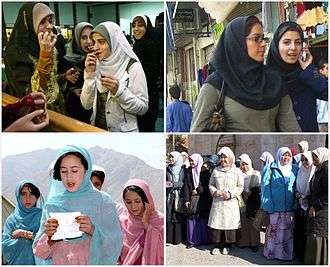
Hijab or ħijāb (حجاب) is the Arabic term for "cover" (noun), based on the root حجب meaning "to veil, to cover (verb), to screen, to shelter." The word primarily refers to women's head and body covering, but in Islamic scholarship, it is given the wider meaning of modesty, privacy, and morality.
Quotes
- To the Muslim woman, the hijab provides a sense of empowerment. It is a personal decision to dress modestly according to the command of a genderless Creator; to assert pride in self, and embrace one's faith openly, with independence and courageous conviction.
- Randa Abdel-Fattah (June 23, 2003). Prejudice is alive and well in the legal profession. The Age.
- The correct view is that a woman is obliged to cover her entire body, even the face and hands. The face is the most tempting part of a woman's body, because what people look at most is the face, so the face is the greatest ‘awrah of a woman.
- Muhammad Al-Munajjid, Ruling on covering the face, with detailed evidence (March 5, 2003), IslamQA.
- Stay, stay, O daughter-in-law - do not cover your face with a veil. In the end, this shall not bring you even half a shell.
- (Bhagat Kabir, Asa, pg. 484)
- In ancient Iran, aristocratic women used to wear hijab. ... Women from lower classes did not bother. But when Islam came, it rejected such instances of discrimination. It said that all women must wear the hijab. In other words, it wanted to honor all women. This is what Islam says. Now, they [in the West] behave as if we are doing something wrong and they are doing the right thing! No, they are in the wrong. They must answer why they have been treating women like a commodity in order to gratify their own lust. ... In their sensationalism concerning women's affairs, they blame us by saying: You have made hijab compulsory. They themselves have made lack of hijab compulsory. They do not allow girl students to enter university, if they wear a headscarf. Yet they have the audacity to question us by saying: Why have you made hijab compulsory? Wearing the hijab, is aimed at honoring women, whereas that [the practices of the West] aim to abuse and insult women.
- Ali Khamenei (July 7, 2008). Iran's Ayatollah: West Abuses Women, Islam Honors Them. CNSNews.com.
- I just wish I felt supported by the image-makers of the West, who seem to have a veil fetish. They are doing the exact opposite of what the European politicians suggest: They're imposing the veil on women.
- The Quran says nothing about the veil, except for an injunction to veil the bosom, which is obvious. As for the face, Muhammad's wife Khadijeh never wore the veil, nor did the other wives of the Prophet after Khadijeh died. [...] The ulema have twisted the Quran with their hadith, always twisting it toward those in power, until the message Muhammad laid out so clearly, straight from God, has been reversed, and good Muslim women are made like slaves again, or worse.
- Kim Stanley Robinson, The Years of Rice and Salt (2002), Book 2: "The Haj in the Heart", Ch. 6.
- For many, the hijab represents modesty, piety and devotion to God, and I truly respect that. Unfortunately, too many people in the Western world mistakenly perceive it as an expression of powerlessness and oppression. And increasingly it is being turned into a political tool. Modernity is not about dress codes. Religion and modernity are not necessarily mutually exclusive. In Jordan, a woman cannot be forced to wear a veil against her will.
- Rania al-Abdullah (May 11, 2007). More Questions with Queen Rania. TIME Magazine.
- Insulating women if they don’t wear the veil ensures that they wear it out of fear not faith… women now accept the position of being slaves.
- As-Said al-Ashwamy, Egyptian writer and chief justice, The Times of India, 10 December, 1993. Quoted from Lal, K. S. (1994). Muslim slave system in medieval India. New Delhi: Aditya Prakashan.
See also
External links
- Why Islamic Hijab, May 2007
- Veiled Babes
Video clips
This article is issued from
Wikiquote.
The text is licensed under Creative
Commons - Attribution - Sharealike.
Additional terms may apply for the media files.